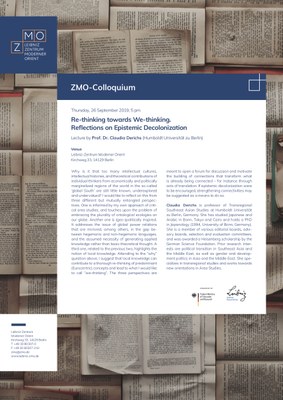26.09. ZMO Colloquium with Claudia Derichs – Re-thinking towards We-thinking. Reflections on Epistemic Decolonization
Why is it that too many intellectual cultures, intellectual histories, and theoretical contributions of individual thinkers from economically and politically marginalized regions of the world in the so-called ‘global South’ are still little known, underexplored and undervalued? I would like to reflect on this from three different but mutually entangled perspec- tives. One is informed by my own approach of criti- cal area studies, and touches upon the problem of embracing the plurality of ontological ecologies on our globe. Another one is (geo-)politically inspired. It addresses the issue of global power relations that are mirrored, among others, in the gap be- tween hegemonic and non-hegemonic languages, and the assumed necessity of generating applied knowledge rather than basic theoretical thought. A third one, related to the previous two, highlights the notion of local knowledge. Attending to the “why” question above, I suggest that local knowledge can contribute to a thorough re-thinking of predominant (Eurocentric) concepts and lead to what I would like to call “we-thinking”. The three perspectives are meant to open a forum for discussion and motivate the building of connections that transform what is already being connected – for instance through acts of translation. If epistemic decolonization were to be encouraged, strengthening connectivities may be suggested as a means to do so.
- https://www.iaaw.hu-berlin.de/en/region/southeastasia/department/transregional/news/zmo-colloquium-claudia-derichs-2013-re-thinking-towards-we-thinking-reflections-on-epistemic-decolonization
- 26.09. ZMO Colloquium with Claudia Derichs – Re-thinking towards We-thinking. Reflections on Epistemic Decolonization
- 2019-09-26T17:00:00+02:00
- 2019-09-26T23:59:59+02:00
- Why is it that too many intellectual cultures, intellectual histories, and theoretical contributions of individual thinkers from economically and politically marginalized regions of the world in the so-called ‘global South’ are still little known, underexplored and undervalued? I would like to reflect on this from three different but mutually entangled perspec- tives. One is informed by my own approach of criti- cal area studies, and touches upon the problem of embracing the plurality of ontological ecologies on our globe. Another one is (geo-)politically inspired. It addresses the issue of global power relations that are mirrored, among others, in the gap be- tween hegemonic and non-hegemonic languages, and the assumed necessity of generating applied knowledge rather than basic theoretical thought. A third one, related to the previous two, highlights the notion of local knowledge. Attending to the “why” question above, I suggest that local knowledge can contribute to a thorough re-thinking of predominant (Eurocentric) concepts and lead to what I would like to call “we-thinking”. The three perspectives are meant to open a forum for discussion and motivate the building of connections that transform what is already being connected – for instance through acts of translation. If epistemic decolonization were to be encouraged, strengthening connectivities may be suggested as a means to do so.
- When Sep 26, 2019 from 05:00 to 11:59
- Where Leibniz-Zentrum Moderner Orient, Kirchweg 33, 14129 Berlin
-
iCal

